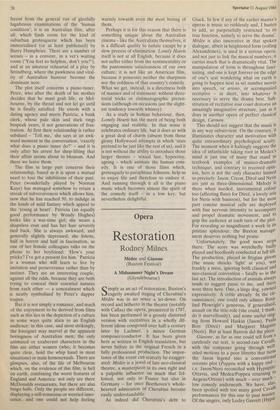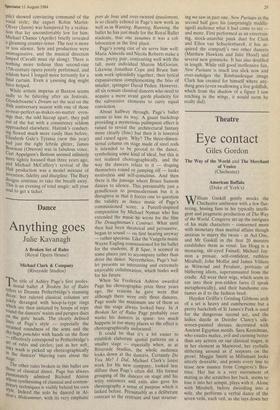O pera
Restoration
Rodney Milnes
Med& and Giasone (Buxton Festival)
Q imply as an act of restoration, Buxton's v..3 eagerly awaited staging of Cherubini's Medee was in no sense a let-down. On record and hitherto in the theatre (notably with Callas) the opera, premiered in 1797, has been performed in a grossly distorted version with recitatives in a wholly dif- ferent idiom composed over half a century later by Lachner, a minor German composer/conductor. It has been given here as written in English translation, but never before in the original French in a fully professional production. The impor- tance of the event can scarcely be exagger- ated: Medee is a jewel of late neo-classical theatre, a masterpiece in its own right and a palpable influence on much that fol- lowed, not only in France but also in Germany - for once Beethoven's whole- hearted admiration of Cherubini became easily understandable.
As indeed did Cherubini's debt to
Gluck. In few if any of the earlier master's operas is music so ruthlessly and, I hasten to add, so purposefully restricted 'to its true function, namely to serve the drama'. Medee is also innovative in that spoken dialogue, albeit in heightened form (rolling Alexandrines), is used in a serious opera, and not just to link the musical numbers; it carries much that is dramatically vital. The manipulation of form is throughout fasci- nating, and one is kept forever on the edge of one's seat wondering what on earth is going to happen next as set number moves into speech, or arioso, or accompanied recitative - in short, into whatever is necessary to serve the drama best. Sub- stitution of recitative tout court destorys an amazingly imaginative structure, just as it does in another opera of perfect classical design, Carmen. This should not suggest that the music is in any way subservient. On the contrary, it illuminates character and motivation with quite extraordinary psychological acuity. The moment when it haltingly suggests the idea of infanticide taking root in Medea's mind is just one of many that stand as textbook examples of musico-dramatic technique, and contrary to received opin- ion, hers is not the only character limned so precisely: Jason, Creon, Dirce and Neris are just as three-dimensional. Melody is there when needed, instrumental colour too (affecting flutes for Dirce, a lovely aria for Neris with bassoon), but for the most part concise musical cells are deployed with fine nervous intensity to accompany and propel dramatic movement, and to grip the audience at each turn of the plot. For revealing so magnificent a work in its pristine splendour, the Buxton manage- ment deserves nothing but praise.
Unfortunately, the good news stops there. The score was wretchedly badly played and heedlessly conducted at full tilt. The production, played in Stygian gloom (the music shrieks 'light' at you), was, frankly a mess, ignoring both classical and neo-classical convention - fatally so in the last act. The introduction of animals always tends to suggest panic to me, and there were three here. One, a large dog, yawned expressively. A critic already. In the cir- cumstances, one could only admire Rosa- lind Plowright's generous, if generalised, assault on the title-role (she could, I think, do it marvellously), and some useful sing- ing from Howard Haskin (Jason), Paula Bott (Dirce) and Margaret Maguire (Neris). But at least Buxton did the piece.
Giasone, as far as one could tell from a carelessly cut text, is second-rate Cava1119 with the composer going through well- oiled motions to a poor libretto that turns the Jason legend into a conventional seicento plot (Poppea with a happy end --, i.e. Jason/Nero reconciled with Hypsipilei Ottavia, and Medea/Poppea returning to Aegeus/Ottone) with much - over much - low comedy underneath. We have, alas° been spoiled with too many good Cavalh performances for this one to pass muster.. Of the singers, only Lesley Garrett (HYPsl pile) showed convincing command of the vocal style; the expert Robin Martin- Oliver (Jason) was hampered by a realisa- tion that lay uncomfortably low for him; Michael Chance (Apollo) briefly revealed a gleaming counter-tenor. The rest is more or less silence. Sets and production were unimaginative, and the musical direction limped (Cavalli must zip along). There is nothing more tedious than second-rate 17th-century opera poorly performed, and seldom have I longed more fervently for a final curtain. Even a yawning dog might have helped.
While artistic impetus at Buxton seems sadly to be faltering after six festivals, Glyndebourne's Dream set the seal on the 50th anniversary season with one of those as-near-perfect-as-makes-no-matter even- ings that, the odd hiccup apart, they pull out of the hat with a consistency seldom approached elsewhere. Haitink's conduct- ing flowed much more easily than before, Elizabeth Gale's Tytania (new this year) had just the right febrile glitter, James Bowman (Oberon) was in fabulous voice, Curt Appelgren's Bottom seemed infinitely More tightly focused than three years ago, and Michael McCaffery's revival of the Hall production was a model mixture of invention, fidelity and discipline. The Bury designs continue to take the breath away. This is an evening of total magic: sell your soul to get a ticket.







































 Previous page
Previous page